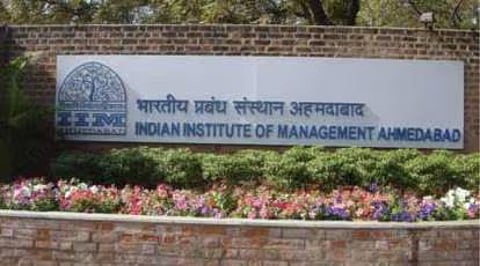
New Delhi- After a seven-year-long struggle for equity and inclusivity, activists are celebrating a major victory as the Indian Institute of Management Ahmedabad (IIMA) has announced that it will implement reservations in its PhD programs for the academic year 2025. The announcement comes after sustained legal and social pressure, culminating in a Public Interest Litigation (PIL) filed in 2021.
The online announcement for IIMA’s PhD Admission 2025 now clearly states, “Government of India guidelines for reservation are followed during admissions.” This simple but crucial statement has given activists hope that deserving candidates from marginalized communities will finally have the opportunity to access one of India’s most prestigious educational institutions.
The fight for implementing reservations in IIMA’s PhD programs began in earnest in 2017 when activist Anil Wagde, along with fellow activists Dr. Suraj Yengde and Arun Khobragade, met with then-IIM Director Prof. D’Souza. Their mission was to advocate for reservations not just in PhD admissions but also in faculty recruitment. Though the activists presented compelling arguments in favor of affirmative action, they were met with resistance. D’Souza acknowledged the validity of their points but maintained that the faculty was "not ready" to implement reservation policies, implying that they operated beyond the framework of the Indian Constitution.
Dissatisfied with the institution's reluctance, Wagde and his colleagues decided to take the matter to court. In 2021, they filed a PIL in the Gujarat High Court, arguing that IIMA’s failure to implement reservation in its doctoral programs violated constitutional provisions, the Central Educational Institutions (Reservation in Admission) Act, and University Grants Commission (UGC) norms. They also pointed out that the absence of reservations in PhD courses was a significant barrier to faculty diversity, as it limited the pool of qualified candidates from marginalized communities.
The PIL gained traction, and by 2022, IIMA filed an affidavit stating that it had “voluntarily decided” to introduce reservations in its PhD programs. However, the affidavit did not specify a timeline for implementation, leaving activists frustrated. The institute argued that devising a methodology to ensure that the reservation system did not result in "discrimination" would take time, describing the process as an “uphill task.”
For activists, this was a familiar pattern of delay and evasion. However, the appointment of a new Director, Bharat Bhaskar, in 2022 provided a fresh opportunity for engagement. Wagde and his colleagues reached out to Bhaskar, who promised to review the issue. While IIMA reaffirmed its commitment to introducing reservations, it was not until 2023 that the institute finally submitted another affidavit in the Gujarat High Court, stating that reservations would likely be implemented by 2025.
IIMA’s counsel informed the Gujarat High Court’s division bench, comprising Chief Justice Sunita Agarwal and Justice Aniruddha Mayee, that the institute would likely implement reservation norms starting from the 2025 academic year. This submission was part of ongoing proceedings in response to the PIL.
While the court welcomed IIMA’s oral submission regarding the introduction of reservations in PhD programs by 2025, Chief Justice Agarwal emphasized that the judiciary could not mandate a specific start date. Nonetheless, the inclusion of the statement that government reservation norms would be followed in this year’s PhD admission advertisement has been seen as a positive step.
However, Wagde remains cautious. "This year’s online announcement for PhD admissions mentions that government reservation guidelines will be followed, which gives us hope," said Wagde, but the PIL will remain active until IIM Ahmedabad fully complies with all the norms.”
The activist said that once the admission processes are complete, they will obtain the full details of the students admitted in various categories through RTI. If any lapses are found, further courses of action will be determined.
Wagde and his fellow activists believe that this victory is not just symbolic but could have a profound impact on the representation of marginalized communities in academia. “Deserving candidates from SC/ST/OBC backgrounds will now have a chance to make it to prestigious institutions like IIMA. This is a step toward creating a more inclusive and diverse academic environment,” Wagde said.
One of the key arguments that Wagde and others have emphasized throughout their campaign is the need for reservations not just in admissions but also in faculty recruitment.
At present, IIM Ahmedabad has no faculty members from SC, ST, or OBC backgrounds, and only one Muslim faculty member has been recruited recently. “Lack of reservation in PhD courses leads to a pipeline problem—there aren’t enough qualified candidates from marginalized backgrounds who can go on to become faculty,” Wagde pointed out.
The activists argue that faculty diversity is essential for an institution like IIMA, which claims to represent the best and brightest minds in India. "India’s diversity should be reflected in our premier educational institutions, but unfortunately, IIMs have largely failed in this regard," Wagde added.
You can also join our WhatsApp group to get premium and selected news of The Mooknayak on WhatsApp. Click here to join the WhatsApp group.